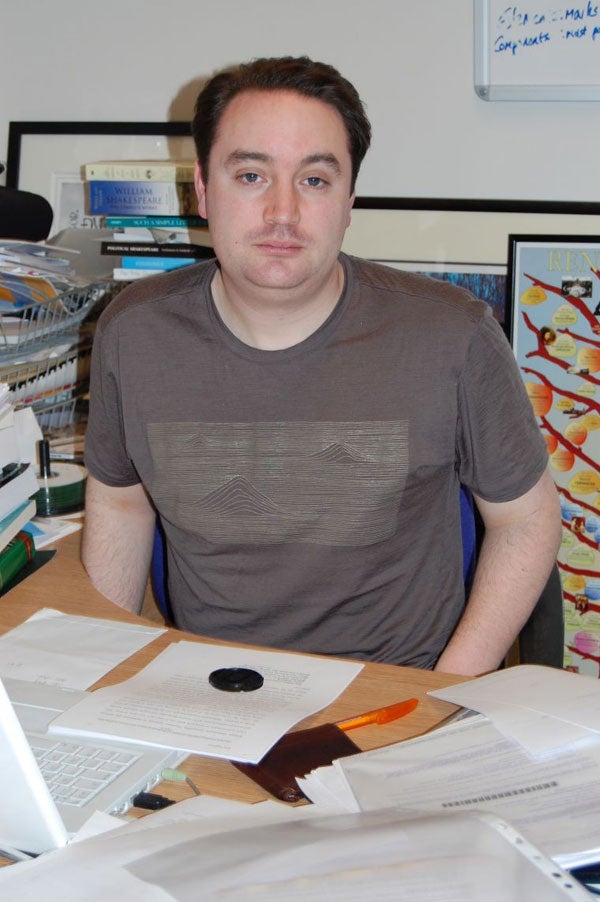Wealth Check: 'I need help securing my first mortgage'

Your support helps us to tell the story
From reproductive rights to climate change to Big Tech, The Independent is on the ground when the story is developing. Whether it's investigating the financials of Elon Musk's pro-Trump PAC or producing our latest documentary, 'The A Word', which shines a light on the American women fighting for reproductive rights, we know how important it is to parse out the facts from the messaging.
At such a critical moment in US history, we need reporters on the ground. Your donation allows us to keep sending journalists to speak to both sides of the story.
The Independent is trusted by Americans across the entire political spectrum. And unlike many other quality news outlets, we choose not to lock Americans out of our reporting and analysis with paywalls. We believe quality journalism should be available to everyone, paid for by those who can afford it.
Your support makes all the difference.A idan Byrne, 34, is an English lecturer at the University of Wolverhampton. He is also writing a book on masculinity in 1930s Welsh literature and enjoys fencing in his spare time.
Aidan says he has the "perfect job", but like many people, he's having trouble getting a mortgage – especially because he works on short-term contracts and has no credit history.
"Being rich doesn't motivate me," he says. "But quality of life and an enjoyable job does. My worst financial fears are unemployment, never being able to afford a house, and not being able to live on my pension."
To make matters worse, Aidan is nervous after several colleagues were made redundant, with more cuts in education funding expected.
Case notes
Income: £42,300
Monthly outgoings: £2,000
Savings: £7,000 in savings and current accounts, £500 ISA, one year deposit of £5,000 Student loan: £1,000
Pension: final salary scheme at 6.4 per cent of salary
Helping steer him through the tough times this week are Danny Cox from Hargreaves Lansdown, Jason Witcombe from Evolve Financial Planning and Philip Pearson from P&P Invest...
Mortgage
Unfortunately for Aidan, the credit crunch has made lenders much more suspicious and less willing to take risks.
Cox explains: "A few years ago Aidan may well have found obtaining a mortgage much easier. Aidan's short-term contracts are not the stable employment lenders are looking for."
There is the option of going via a specialist broker, but the costs would be higher and committing to something would be risky if unemployment is a possibility.
In any case, Cox predicts the housing market is unlikely to push forward in 2010 so it's probably worth holding off for now.
Credit score
It seems counter-intuitive, but Pearson thinks Aidan may be disadvantaging himself by not having a credit card.
"We each have a credit score," he says. "If you have a good track record of making credit payments then you increase your chance of being able to obtain a mortgage."
Aidan can improve his credit score simply through using a card and making payments on time – perhaps via direct debit.
Cox adds: "I am not suggesting racking up debt, but using the card for normal purchases and ensuring it is cleared every month."
However, Witcombe dismisses the theory as "an urban myth, no doubt perpetuated by credit card companies". Instead, he recommends saving a larger deposit to convince banks of his reliability.
Deposit
The bigger the deposit he saves, the better the deal Aidan can get on a mortgage. It's time to get his savings to work for him – and that's not happening while they're sitting in a current account.
The experts recommend making the most of his tax-free ISA account, where he can stash £3,600 now and £5,100 from April 6.
Witcombe explains: "It won't take long for him to convert all of his taxable savings into tax-free savings.
"The saving might not feel significant in the low interest environment but if interest rates start to rise, and if Aidan becomes a 40 per cent taxpayer, the savings will start to add up."
Pearson thinks the most competitive instant access account is currently the Standard Life Cash ISA. Alternatively, if he can afford keep his money at arm's length for two years, the Birmingham Midshires Fixed Interest Cash ISA offers a good two-year return.
He also recommends investing with an Equity ISA, which has the potential to bring in greater returns.
Pension
In these tough times, Aidan should feel lucky to be contributing to a final salary pension scheme. "Sadly, there are very few such schemes open to new joiners," says Witcombe. "Those individuals who do have access to such schemes shouldn't underestimate the value of them."
Cox estimates he could build up a final salary of £17,000 per year if he worked at the university until he is 65 – not bad for a foundation pension.
Once he has his house sorted, Aidan should see if he can make extra pension payments to increase the final sum.
If not, Pearson recommends putting aside extra money into a stakeholder pension, which allows people to contribute up to 100 per cent of their salary.
Tax
Aidan is fortunate to be earning a decent salary – but if it increases any more he'll have to pay the higher rate tax of 40 per cent.
Pearson thinks he can overcome this by paying extra money into a pension fund, which would get tax relief.
He says: "It would provide a very tax-efficient means of saving over the long term towards retirement."
For a free financial check-up, write to Wealth Check, The Independent, 2 Derry Street, London W8 5HF; or email wealthcheck@independent.co.uk
Join our commenting forum
Join thought-provoking conversations, follow other Independent readers and see their replies
Comments